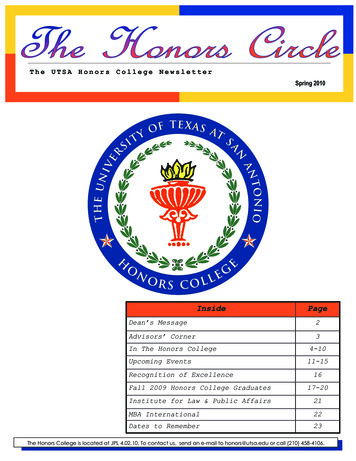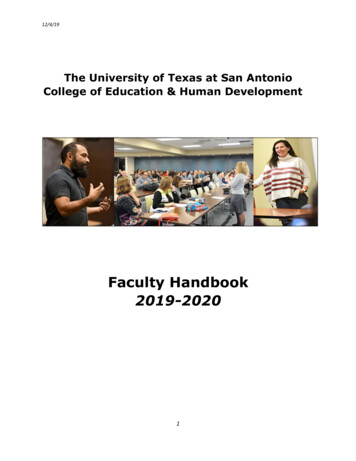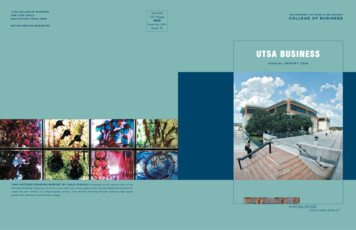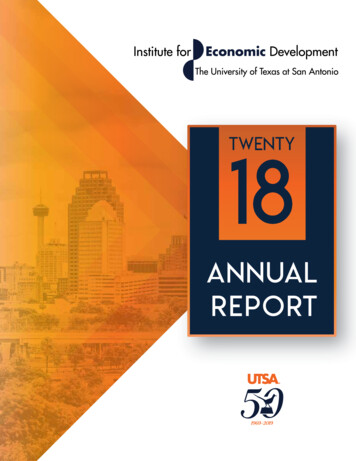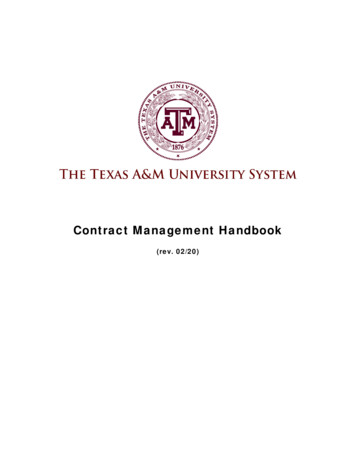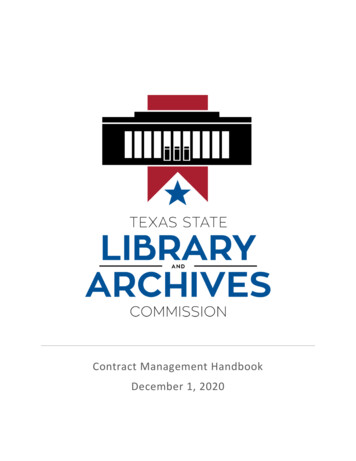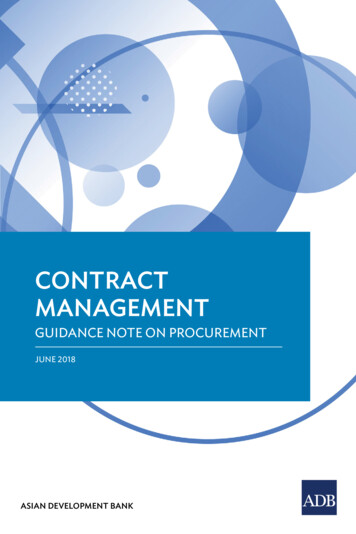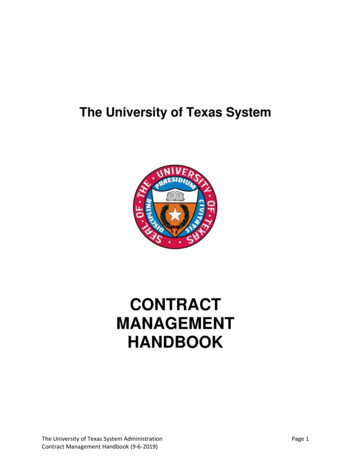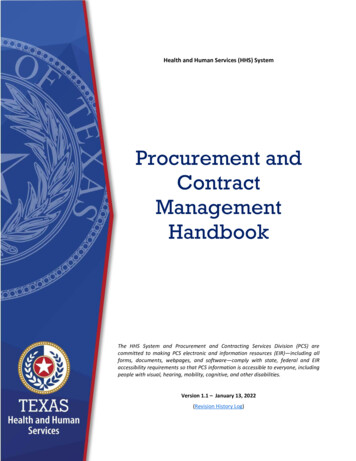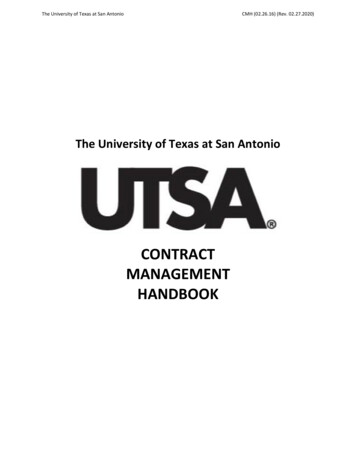
Transcription
The University of Texas at San AntonioCMH (02.26.16) (Rev. 02.27.2020)The University of Texas at San AntonioCONTRACTMANAGEMENTHANDBOOK
The University of Texas at San AntonioCMH (02.26.16) (Rev. 02.27.2020)TABLE OF CONTENTSChapter 11.11.21.31.41.51.61.71.8Chapter 22.12.22.32.42.52.6Introduction . . 4PurposeDefinitionsAcronymsTraining for Purchasing and Contracting PersonnelEthics Standards and PoliciesConflict of InterestNew Legislative Requirements Related to Ethics, Purchasing, and ContractingDisclosure of Interested PartiesPlanning . . 20Contract Management TeamCommunications PlanDetermining Competitive Procurement MethodPlanning for Contract ContentInformation Security; Access to Electronic and Information ResourcesRecord RetentionChapter 33.13.23.33.43.53.63.7Preparing the Solicitation 41Historically Underutilized Business (HUB) RequirementsContract TermBackground InformationProposal Submission RequirementsEvaluation of ProposalsSolicitation RequirementsPayment TypesChapter 44.14.24.34.44.54.6Publication of the Solicitation . . 55AdvertisingSolicitation AnnouncementsCommunication with RespondentsWritten QuestionsPre-Proposal ConferencesSolicitation Submission and OpeningChapter 55.15.25.35.45.55.65.75.85.95.105.115.12Evaluation and Award . 59Evaluation GuideEvaluation TeamScoring MatrixResponsive ProposalsEvaluation Team(s) TrainingSingle ResponsesProposal EvaluationReferencesOral Presentations/DiscussionsBest and Final OffersNegotiationsAwardPage 2 of 132
The University of Texas at San AntonioCMH (02.26.16) (Rev. 02.27.2020)Chapter 66.16.26.36.46.56.66.76.8Contract Formation. . 67Approach to Contract FormationLegal Elements of a ContractDrafting the ContractPlanning for Contract PreparationForm of the ContractContract TermsAuthority to Sign ContractsRequired Check of Vendor Hold StatusChapter 77.17.27.37.47.57.67.77.8Contract Administration . 77Planning and Importance of SOWPerformance MonitoringContract Reporting ObligationsInvoices and PaymentsChange Management ProcessDispute Resolution ProcessTerminationContract Close-OutVersion History . . . 94AppendicesAPPENDIX 1APPENDIX 2APPENDIX 3APPENDIX 4APPENDIX 5APPENDIX 6APPENDIX 7APPENDIX 8APPENDIX 9APPENDIX 10APPENDIX 11APPENDIX 12APPENDIX 13APPENDIX 14APPENDIX 15APPENDIX 16APPENDIX 17APPENDIX 18Contract Management Best Practices MatrixUTSA Procurement Training and Certification ProgramSummary of 2015 Procurement and Contracting LegislationSummary of UT Procurement GuidelinesGoods and Services Exempt from Procurement CompetitionExclusive Acquisition Justification FormSample Non-Disclosure StatementSample Solicitation AnnouncementSample Pre-Proposal Conference GuidelinesSample Proposal Score SheetSample Administrative Review ChecklistEvaluation Team Guidelines and Purchasing Office ResponsibilitiesSample Evaluation Team Written InstructionsSample Reference Check FormProtest ProceduresSample Contract TermsGuidelines for Establishing Risk in Procurement ProjectsSample Contract Monitoring WorksheetPage 3 of 132
The University of Texas at San AntonioCMH (02.26.16) (Rev. 02.27.2020)CHAPTER 1INTRODUCTION1.1PurposeThe purpose of this Contract Management Handbook (Handbook) is to offer purchasing personnel,business contract officers, and other administrators recommendations on documenting existingprocurement and contracting processes and practices in connection with the procurement ofgoods/services.1.1.1 Transactions Not Covered by Handbook.Various types of contracts are subject to different statutory standards, practices, processes, and strategiesfor successful implementation. The suggestions, comments, techniques, examples and recommendationsincluded in this Handbook are not appropriate for every type of contract. Nevertheless, this Handbookmay provide helpful information useful in connection with contracts that are not governed by theHandbook, such as those listed below.This Handbook does not govern Real estate transaction contracts (even if the transaction is a lease under which an Institution providesservices in exchange for compensation),Sponsorship agreements under which Institutions receive compensation in exchange for recognitionof the sponsor,Sponsored research contracts or other intellectual property agreements where Institutions convey aninterest in intellectual property.Construction contracts, including professional architectural and engineering contracts. Construction-related Contracts: Construction and professional architectural and engineeringcontracts (“Construction Contracts”) are governed by specific statutory requirements and mustbe procured in accordance with the UT System Construction Contracting Guidelinespromulgated by the Construction Law Specialty Area within UT System Office of General Counsel(“OGC”). The Construction Contracting Guidelines, as well as Construction Contract agreementsand related policies and procedures, are located onOGC’s website at nstruction-law-0.1.1.2 Applicable Laws; University Rules.Use of this Handbook does not relieve Institutions and contractors of their responsibility to comply withApplicable Laws and University Rules related to specific programs and funding sources.1.1.3 Core Processes.For purposes of this Handbook, contract management includes the coordination and administration offour core processes: Planning;Procurement of goods or services (including complying with HUB laws and policies);Contract Formation (including scope of work, specification of contract price or rate and otherrelevant terms and conditions); andContract Administration.Page 4 of 132
The University of Texas at San AntonioCMH (02.26.16) (Rev. 02.27.2020)The nature and level of risk associated with each of these contract management elements vary dependingon the type of contract and the business relationship between the Institution and contractor. It is theresponsibility of the chief business officer of each Institution to assign responsibilities, assure appropriatetraining and oversight, and monitor the processes so that each procurement achieves best value for theInstitution.1.1.4 Coordination of Disciplines and RolesFully implemented contract management requires coordinating and administering the four coreprocesses. Depending on the risk of a procurement, contract management may also involve coordinationof a variety of distinct disciple ines and roles, including: Executive Management;Project Management;Planning;Program Staff (subject matter experts and monitors);Contractor Interaction;Purchasers;Accounting and Budget;Legal;Audit; andQuality Control/Assurance.1.1.5 Overview of Handbook Content and Purpose. This Handbook: Summarizes certain mandatory statutory, regulatory and policy compliance requirements related toInstitution contracting activities that are evidenced by Handbook references to the applicable statute,regulation, or policy.Provides practical suggestions and best practices related to Institution contracting activities which areencouraged but not mandatory. Taking into consideration the complexity of the contract on whichthe Institution is working, Institutions should exercise reasonable business judgment when applyingpractical suggestions and best practices. Recognizing that the needs of each Institution and therequirements of each contract are different, the information in this Handbook is intended to beapplied flexibly, not mechanically. This Handbook provides a framework for making contractingdecisions that are in the best interest of the Institution.Provides a Contract Management Best Practices Matrix attached as APPENDIX 1 that includes asummary of best practices designed to help Institutions determine where a contract managementprogram currently stands in relation to generally accepted contract management best practices. Thismatrix offers a number of best practices in several key contract management areas and may be usedto improve practices and to implement the best contract management program possible. The matrixis intended to assist Institutions with organizing contract management programs and leveragingtechnology, metrics, training and lessons learned for the purpose of minimizing risks throughout theoverall supply chain. The matrix also includes a reference section that points to the applicableChapters of this Handbook related to each contract management component.Describes the duties of the contract management team, including how to solicit and select acontractor, develop and negotiate a contract, and monitor contractor and (if applicable) subcontractorperformance.Supplements (but does not replace) Applicable Laws and University Rules. Each Institution isindependently responsible for developing sound business policies and procedures in accordance withApplicable Laws and University Rules.Page 5 of 132
The University of Texas at San Antonio CMH (02.26.16) (Rev. 02.27.2020)Discusses many general legal principles; however, these general principles include many exceptions.This Handbook Is not intended to be a manual on the law of contracts or constitute legal advice. Onany legal questions that arise with contracts, the Institution’s representative for the particularcontract should consult with (as applicable) either the Institution’s Business Contracts Office, LegalOffice, or the UT System Office of General Counsel.Includes model contract provisions and indicates whether each provision is essential orrecommended.Addresses the permitted extent of contract changes that may be made before a new competitivesolicitation should be considered.Suggests time frames for the solicitation, evaluation, negotiation and awarding of a major contract.Establishes the procedure for attempting to determine why a single response was received in reply to aprocurement solicitation.This Handbook does not constitute specific legal advice on any particular issue that may arise. Feel freeto consult with appropriate legal advisors as necessary.Where can I go for more information?APPENDIX 1 – Contract Management Best Practices MatrixPage 6 of 132
The University of Texas at San Antonio1.2CMH (02.26.16) (Rev. 02.27.2020)DefinitionsAddendum: An addition, change, or supplement to a solicitation issued prior to the opening date.Advertise: A public announcement of the intention to purchase goods/services.Amend or Amended: Status change to an RFP, IFB, RFI, RFQ or contract that indicates a modification tothat document.Amendment: Written addition or change to a contract, including modifications, renewals and extensions.Applicable Laws: All applicable federal, state or local, laws, statutes, regulations, ordinances and orders.Assignment: Transfer of contractual rights from one party to another party.Best Value: Factors to be considered in determining best value in making certain purchases ofgoods/services (ref. Texas Education Code, 51.9335 (all Institutions except UTMDACC), 73.115(UTMDACC) and 74.008 (UTMB)).Best Value Invitation for Bids (IFB): Best value procurement process used when the requirements areclearly defined, negotiations are not necessary and price is the primary determining factor for selection(also known as best value Invitation to Bid or ITB). The mandatory evaluation criteria that must be usedto evaluate bids are specified by the Best Value Statutes.Best Value Statutes: The laws that authorize Institutions to use the specified best value procurementprocedures for goods/services, but not professional services. (ref. Texas Education Code, §§ 51.9335 (allInstitutions except UTMDACC), 73.115 (UTMDACC) and 74.008 (UTMB)).Bid: An offer to contract with the state, submitted in response to an invitation for bids (IFB). Bids areusually non-negotiable.Bidder: An individual or entity that submits a bid. The term includes anyone acting on behalf of theindividual or other entity that submits a bid, such as agents, employees and representatives (see Proposerand Respondent).Biennium: The two (2) year period in which the Texas Legislature appropriates funds. The biennium beginson September 1st of odd numbered years.Board of Regents: The Board of Regents of The University of Texas System.Bond: Note or other form of evidence of obligation issued in temporary or definitive form, including anote issued in anticipation of the issuance of a bond and renewal note.Business Entity: An entity (other than a governmental entity or state agency) through which business isconducted with an Institution, regardless of whether the entity is a for-profit or nonprofit entity.Certificate of Filing: The disclosure acknowledgement issued by the Texas Ethics Commission to the filingBusiness Entity.Competitive Sealed Proposals: Process of advertising a request for proposal (RFP), the evaluation ofsubmitted proposals and awarding of the contract.Page 7 of 132
The University of Texas at San AntonioCMH (02.26.16) (Rev. 02.27.2020)Consultant: A person that provides or proposes to provide a consulting service.Consulting Service: Practice of studying or advising a state agency under a contract that does not involvethe traditional employer/employee relationship (ref. Texas Government Code, §2254.021 Definitions).Contract: An agreement (including a purchase order) where a contractor provides goods/services to anInstitution and the Institution pays for such goods/services in accordance with the established price, termsand conditions, as well as an agreement under which a contractor is given an opportunity to conduct abusiness enterprise on an Institution’s premises in exchange for compensation to the Institution (i.e.,auxiliary enterprise contracts).Contract Administration: This generally refers to the processes that occur after a contract is signed and isexplained in detail in Chapter 7.Contract Advisory Team: The team created to assist state agencies in improving contract managementpractices (ref. Texas Government Code, Chapter 2262 Statewide Contract Management, Subchapter CContract Advisory Team).Contract Management: The entire contracting process from planning through contract administration,including contract close-out.Contractor (or Vendor): A business entity or individual that has a contract to provide goods/services toan Institution.Controlling Interest: (1) an ownership interest or participating interest in a Business Entity by virtue ofunits, percentage, shares, stock or otherwise that exceeds 10 percent; (2) membership on the board ofdirectors or other governing body of a Business Entity of which the board or other governing body iscomposed of not more than 10 members; or (3) service as an officer of a business entity that has 4 orfewer officers, or service as one of the 4 officers most highly compensated by a Business Entity that hasmore than 4 officers.Deliverable: A unit or increment of work required by a contract, including such items as goods, services,reports, or documents.Electronic State Business Daily (ESBD): The electronic marketplace where State of Texas bid opportunitiesare posted (ref. Texas Government Code, §2155.083 State Business Daily; Notice RegardingProcurements). Pursuant to Texas Government Code, §2155.083(n), IHEs to which Texas Education Code,§§ 51.9335 or 73.115 apply are not subject to §2155.083.Emergency: A purchase made when an unforeseen and/or a sudden unexpected occurrence creates aclear and imminent danger, requiring immediate action to prevent or mitigate the loss or impairment oflife, health, property, or essential public services.Exclusive Acquisition: Purchase of goods/services that exceed the authorized direct procurement dollarthreshold (typically 15,000 for Institutions) from a single vendor, without soliciting competitive offers orproposals. The term includes proprietary/sole source purchases.Executive Sponsor: A management-level individual with primary responsibility for implementation andoperation of the project. The extent and degree of executive sponsorship and participation should bedirectly related to the level of risk associated with the procurement. For most contracts, the executivesponsor will simply be the division or program director with overall project responsibility. In rareinstances, of very high-risk contracts, the executive sponsor may be the Vice President or even executivehead of the Institution.Page 8 of 132
The University of Texas at San AntonioCMH (02.26.16) (Rev. 02.27.2020)Financial Advisors or Service Providers: Persons or business entities who act as a financial advisor,financial consultant, money or investment manager, or broker.Goods: Supplies, material, or equipment, including a transportable article of trade or commerce that canbe bartered or sold. Goods do not include construction services or real property.Group Purchasing Organization (GPO): A purchasing program established by (1) a state agency that isauthorized by law to procure goods/services for other state agencies, such as the Texas Procurement andSupport Services Division of the Texas Comptroller of Public Accounts and the Texas Department ofInformation Resources, or any successor agencies, respectively; or (2) a group purchasing organization inwhich the Institution participates, such as Novation, Premier, Western States Contracting Alliance, andU.S. Communities Government Purchasing Alliance; or (3) the UT System Supply Chain Alliance.Handbook: The University of Texas Contract Management Handbook.Historically Underutilized Business (HUB): A minority-owned, woman-owned or certain disabled veteranowned businesses as defined by Texas Government Code, Title 10, Subtitle D, Chapter or/hub/).Institutions of Higher Education: Institutions of higher education as defined by Texas Education Code,§61.003(8).Institution: UT System and the institutions comprising UT System as listed in Regents’ Rule 40601.Interested Party: (1) a person who has a Controlling Interest in a Business Entity with whom an Institutioncontracts; or (2) a person who actively participates in facilitating the contract or negotiating the terms ofthe contract with the Institution, including a broker, intermediary, adviser, or attorney for the BusinessEntity.Intermediary: A person who actively participates in the facilitation of the contract or negotiating thecontract, including a broker, adviser, attorney, or representative of or agent for the Business Entity who:Receives compensation from the Business Entity for the person’s participation;Communicates directly with the Institution on behalf of the Business Entity regarding the contract; andIs not an employee of the Business Entity.Negotiations: A consensual bargaining process in which the parties attempt to reach agreement on adisputed or potentially disputed matter. In a contractual sense, negotiation means the “dealingsconducted between two or more parties for the purpose of reaching an understanding.”Payment Bond: A bond executed in connection with a contract which secures the payment requirementsof contractor.Performance Bond: A surety bond that provides assurance of a contractor’s performance of a certaincontract. The amount for the performance bond is based on the value of the contract.Pre-proposal Conference: A meeting chaired by Institution personnel that is designed to help potentialbidders/proposers/respondents understand the requirements of a solicitation. Also known as a pre-bidconference.Page 9 of 132
The University of Texas at San AntonioCMH (02.26.16) (Rev. 02.27.2020)Professional Services: Services directly related to professional practices as defined by the ProfessionalServices Procurement Act (Texas Government Code, §2254.002). These include services within the scopeof the practice of: accounting; architecture; optometry; medicine; land surveying; and professionalengineering. Services provided by professionals outside the scope of their profession (for example,management consulting services provided by accounting firms) are not considered professional services.Contracted services provided by professionals that fall outside their scope of practice are governed by theBest Value Statutes applicable to the purchase of goods/services.Program Staff: Typically the requesting department and Executive Sponsor. Dependent on theprocurement or contract, Program Staff may also include other Institutional subject matter experts(SMEs).Project Team: Program Staff and the Purchasing Office. Dependent on the procurement or contract, theProject Team may also include SMEs, and staff in the Business Contracts Office, HUB Office, the LegalOffice, Risk Management, IT, and other institutional stakeholders.Proposal: An executed offer submitted by a respondent in response to a Request for Proposals (RFP) andintended to be used as a basis to negotiate a contract award.Proposer: An entity submitting a proposal in response to a solicitation. The term includes anyone actingon behalf of the individual or other entity that submits a proposal, such as agents, employees andrepresentatives (see Respondent).Proprietary Purchase: (see Exclusive Acquisition)Purchasing Office: The office designated to purchase goods/services above the direct procurement dollarthreshold for an Institution.Regents’ Rules: The Rules and Regulations of the Board of Regents of The University of Texas System.Renewal: Extension of the term of an existing contract for an additional time period in accordance withthe terms and conditions of the original or amended contract.Request for Information (RFI): A general invitation to contractors requesting information for a potentialfuture competitive solicitation. The RFI is not a competitive solicitation and a contract may not be awardedas the result of an RFI. An RFI is typically used as a research and information gathering tool for preparationof a competitive solicitation.Request for Proposal (RFP): A solicitation requesting submittal of a proposal in response to the requiredspecifications and SOW and usually includes some form of a cost proposal. The RFP process allows fornegotiations between a respondent and the Institution. The mandatory evaluation criteria that must beused to evaluate proposals are specified by the Best Value Statutes.Request for Qualifications (RFQ): A solicitation requesting submittal of qualifications or specializedexpertise in response to the scope of services required. No pricing is solicited with an RFQ.Responsive: A respondent or proposal that complies with all material aspects of the solicitation, includingsubmission of all required documents.Respondent: An entity submitting a proposal in response to a solicitation. The term includes anyone actingon behalf of the individual or other entity that submits a proposal, such as agents, employees andrepresentatives (see Proposer).Page 10 of 132
The University of Texas at San AntonioCMH (02.26.16) (Rev. 02.27.2020)Scope of Work (SOW): An accurate, complete, detailed, and concise description of the work to beperformed by the contractor.Service: The furnishing of skilled or unskilled labor by a contractor which may not include the delivery ofa tangible end product. In some cases, services and goods may be combined (such as film processing). Inthese instances, Institutions should determine whether labor or goods is the primary factor. In the caseof film processing, the labor to process the film is the primary factor, therefore film processing isconsidered a service.SME(s): Subject matter experts on the scope and related business requirements of a particularprocurement or contract.Sole Source: (see Exclusive Acquisition)Solicitation: A document requesting submittal of bids, proposals, quotes or qualifications forgoods/services in accordance with the advertised specifications.Specification: Any description of the physical or functional characteristics or of the nature ofgoods/services to be purchased. It may include a description of any requirements for inspecting, testing,or preparing goods/services for delivery.State: The State of Texas.State Agency: An agency of the State of Texas as defined in Texas Government Code, §2056.001 (excludingInstitutions).Statute: A law enacted by a legislature.Sub-recipient: A non-federal entity that expends federal awards received from a pass-through entity tocarry out a federal program, but does not include an individual that is a beneficiary of such a program. Asub-recipient may also be a recipient of other federal awards directly from a federal awarding agency.Surety: A person or entity providing a bond to a contractor to indemnify the Institution against all directand consequential damages suffered by failure of contractor to perform the contract and to pay all lawfulclaims of subcontractors, materials vendors and laborers as applicable.University Rules: The Regents’ Rules at ents-rulesand-regulations; the policies of UT System at https://www.utsystem.edu/sites/policy-library; and theInstitutional rules, regulations and policies of the applicable Institutions.UT System: The University of Texas System.Vendor (or Contractor): A business entity or individual that has a contract to provide goods/services toan Institution.Page 11 of 132
The University of Texas at San Antonio1.3CMH (02.26.16) (Rev. 02.27.2020)AcronymsBAFO: Best and Final OfferCPA:State of Texas Comptroller of Public AccountsDIR:State of Texas Department of Information ResourcesEIR:Electronic and Information ResourcesESBD: Electronic State Business DailyGPO:Group Purchasing OrganizationHSP:HUB Subcontracting PlanHUB:Historically Underutilized BusinessIFB:Best Value Invitation for Bid (also known as Invitation to Bid or ITB)IHE:Institution of Higher EducationIR:Information ResourcesLBB:Texas Legislative Budget BoardOGC:The University of Texas System Office of General CounselRFI:Request for InformationRFP:Request for ProposalRFQ:Request for QualificationsSAO:State of Texas Auditor’s OfficeSMEs: Subject Matter ExpertsSOW: Scope of WorkTAC:Texas Administrative CodeTPSS:Texas Procurement and Support Services Division of CPAPage 12 of 132
The University of Texas at San Antonio1.4CMH (02.26.16) (Rev. 02.27.2020)Training for Purchasing and Contracting PersonnelInstitutions must train officers and employees authorized to execute contracts for the Institution or toexercise discretion in awarding contracts, including training in ethics, selection of appropriateprocurement methods, and information resources purchasing technologies (ref. Section 51.9337(b)(5),Texas Education Code).Institutions must also comply with purchasing personnel training requirements set out in UTS156Purchaser Training and Certification. Institutions will also comply with local policies and proceduresrelated to training.In addition, Institutions are encouraged to assure that all personnel who process competitiveprocurements of goods or services or administer and manage competitive procurement contracts receivetraining that covers topics related to:1)2)3)4)5)6)7)Fair and objective selection and negotiation with the most qualified contractor;Establishing prices that are cost-effective and that reflect the cost of providing the service;Inclusion of provisions in a contract that hold the contractor accountable for results;Monitoring and enforcing a contract;Making payments consistent with the contract;Compliance with any requirements or goals contained in the contract management guide; andUse and application of advanced sourcing strategies, techniques, and tools. UTSA Procurement Training & Certification Program. UTSA’s specific requirements forprocurement training and certification are located in APPENDIX 2, UTSA Procurement Training &Certification Program.Where can I go for more information?Texas Education Code §51.9337(b)(5)UTS156 Purchaser Training and Certification Policy1.5Ethics Standards and PoliciesInstitution officers and employees are responsible for maintaining the high ethical standards required forour stewardship of public monies. All Institution officers and employees should pursue a course of conductthat does not create a conflict of interest.Institution purchasing personnel must adhere to the highest level of professionalism in dischargingtheir official duties. The nature of the procurement function makes it critical that everyone in thepurchasing a nd co n tr act i ng process remain independent and free from the perception ofimpropriety. Any erosion of public trust or any shadow of impropriety is detrimental to the integrityof the purchasing process. Clear, established guidelines and rules provide credibility for a purchasingprogram. Such guidelines are designed to prevent current and potential vendors from influencingInstitution officers or employees in discharging their official duties. In addition, these guidelines will helpprevent Institution officers’ and employees’ independent judgment from being compromised.With these principles in mind and in accordance with state law, Institution officers and employees willadhere to the following policies and procedures, as well as Applicable Laws and University Rules.Page 13 of 132
The University of Texas at San AntonioCMH (02.26.16) (Rev. 02.27.2020)1.5.1 Institution Ethics PolicyInstitution officers and employees may not have a direct or indirect interest, including financial and otherinterests, engage in a business transaction or professional activity, or incur any obligation of any nature,that is in substantial conflict with the proper discharge of the officer’s or employee’s duties in the publicinterest.1.5.2 Standards of ConductAn Institution officer or employee will not: Accept or solicit any gift, favor, or service that might reasonably tend to influence the officer oremployee i
The purpose of th Contract Management is Handbook (Handbook) is to offer purchasing personnel, business contract officers, and other administrators recommendations on existing documenting procurement and ing processes and practicescontract in connection with the procurement of goods/services. 1.1
